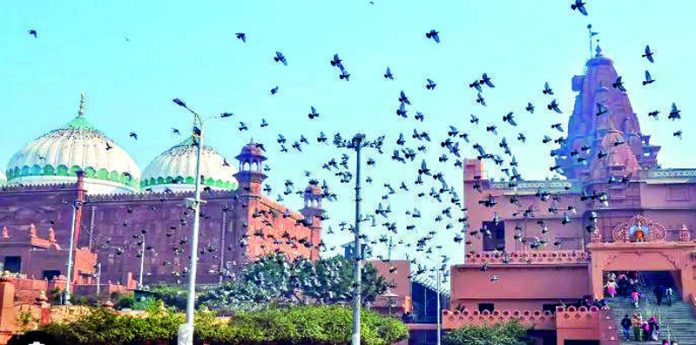PRAYAGRAJ, May 20 : The Hindu side in the Krishna Janmabhoomi-Shahi Idgah dispute in Mathura on Monday submitted that the Places of Worship Act, 1991, applies only in the case of undisputed structure and not in the case of a disputed structure, as is the case in present suit.
In the present case, the character of the structure is still to be decided and it is to be decided only by evidence, it said.
“An illegal construction on a temple cannot bar the institution of suit. All this to be decided in suit itself on merit. Application under Order 7 Rule 11 (regarding maintainability of suits) can only be decided after framing issues and offering evidence from parties,” the counsel for the Hindu side submitted.
On the question of a compromise entered into 1968, it was submitted that it cannot be seen at the stage of deciding application on maintainability of suit.
Earlier, the Muslim side had before the court submitted that the suit was barred by limitation because the parties had entered into a compromise on October 12, 1968.
It said that by that compromise the land in dispute was given to the Intezamia Committee of Shahi Idgah and the said compromise was confirmed in a civil suit decided in 1974.
The limitation to challenge a compromise is three years but the suit was filed in 2020 and thus the present suit is barred by limitation, it had argued.
The matter is being heard by Justice Mayank Kumar Jain on applications (under Order 7 Rule 11 CPC) moved by the Muslim side regarding the maintainability of suits. The hearing will continue on Tuesday.
The counsel for the Hindu side argued that the suit is maintainable, the plea regarding non-maintainability can only be decided after evidence.
The Hindu side counsel cited a Supreme court judgement passed in the Manik Chand vs Ram Chandra case in 1980, according to which, though a minor cannot enter into a contract, under the Hindu law a minor can enter into a contract through a guardian.
Same will also apply in the case of a deity, the counsel said.
It was further submitted that in the alleged compromise of 1968, the deity was not a party, nor was it a party in the court decree passed in 1974.
The said compromise was entered into by the Sri Janm Sewa Sansthan, which was not empowered to enter into any compromise, the counsel said. (PTI)
Trending Now
E-Paper


